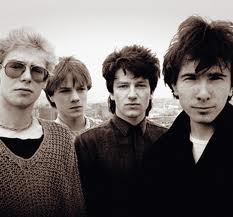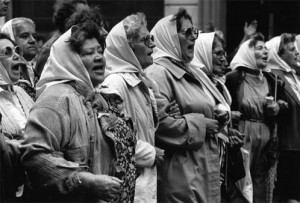I have always loved U2. I think pretty much everyone has a favorite U2 song. Even though the song “With or Without You” was played at every tri-stake dance when I was a teenager, I didn’t have a real connection with U2 until I began studying about Latin America in college. I’m half Guatemalan and I served my mission in Argentina, so when I started college I had a great interest in learning more about the people I served as well as my roots. And, let’s be honest, I didn’t know what else to do at the time so the default was a Spanish major!
While I was on my mission I heard stories about how the military had control of the government between 1976 and 1983. These years were known as the “Dirty War.” During this time, people who voiced opinions that differed from the government’s would literally disappear. This was happening in other countries as well: Chile, Nicaragua, and El Salvador. In 1977 a group of mothers gathered at the Plaza de Mayo in Buenos Aires, Argentina, in front of the presidential palace (the Casa Rosada) to defy the government’s terrorism state. Bono wrote a song about it called “Mothers of the Disappeared” to bring attention to what had happened in all of those countries. Once I learned about and really studied this piece of history, the song became very powerful to me – it became alive and real. I began to feel their pain.
Midnight, our sons and daughters
Were cut down and taken from us
Hear their heartbeat
We hear their heartbeat
In the wind we hear their laughter
In the rain we see their tears
Hear their heartbeat
We hear their heartbeat
Night hangs like a prisoner
Stretched over, black and blue
Hear their heartbeat
We hear their heartbeat
In the trees our sons stand naked
Through the walls our daughters cry
See their tears in the rainfall
Ever since that defining experience, I have felt a deeper connection with U2’s music and lyrics. The band sings about a variety of subjects, but a recurring theme in their lyrics is the fight of the human spirit. This was especially evident during the Elevation tour when they played one of my favorite songs – “Walk On.” During the song a banner was raised that listed off every victim of 9/11. It was the most emotional I have ever been at a rock concert, and I felt uplifted. I felt that I needed to be a better person. I think I am a better person from that experience.
Because of that tour, U2 was asked to perform for the Super Bowl halftime show. Their set included “Beautiful Day” and then “MLK” was played as an introduction to “Where the Streets Have No Name.” Once again the names were raised in an overpowering tribute to those who died on 9/11. Have a watch and a listen.
After I watched the Super Bowl performance I often wondered why they played “Where the Streets Have No Name” as the tribute song (aside from the fact that it is a very well known U2 song). I found out that “Where the Streets Have No Name” was the byproduct of Bono’s childhood: he could tell the economic status of a person based on the street that person lived on. So the idea behind the song is having a place where the streets have no name; where everyone is equal.
I think U2 chose that song because in the midst of tragedy, where you are from, what religion you are, how much money you make, etc. instantly mean nothing. In the midst of tragedy, all of those things are forgotten and we look out for each other a little better. A lot better. We arrive at a place where the streets have no name. The trick is finding this place outside of tragedy.
And they had aall things common among them; therefore there were not rich and poor, bond and free, but they were all made free, and partakers of the heavenly bgift. (4 Nephi 1:3)
There were no robbers, nor murderers, neither were there Lamanites, nor any manner of -ites; but they were in aone, the children of Christ, and heirs to the kingdom of God. (4 Nephi 1:17)
For me, the song “Where the Streets Have No Name” is a calling to lift others up who are suffering, or, even better, go down to where they are and comfort them. There will always be inequality, but we can make the effort to strip away our timidness and pride, to stretch out a hand to those in need.
This post serves as an introduction for an upcoming series on RationalFaiths. We want to shed some light on a terrific blog called “No Poor Among Them.” It focuses on service projects and charities that are making a difference around the world. It also highlights various things that Church members are doing individually to help those in need. I hope that providing this type of information and sharing what some really amazing people are accomplishing will inspire you to do a little more for your brothers and sisters who are in desperate need. Thanks to David Dixon for creating “No Poor Among Them” and for allowing us to cross-post the projects here.
“To a hungry man a piece of bread is the face of God” -Mahatma Gandhi
Films and links worth your time:
“The Official Story” or “La Historia Oficial” Read about it here. This movie won an Oscar and other awards.
U2’s Rattle and Hum
Innocent Voices – On Netflix right now! This war inspired U2’s Bullet the Blue Sky
Kiva.org – Micro-lending for small businesses in 3rd world countries. I’m a HUGE fan of kiva.
NoPoorAmongThem
LiahonaChildren – The mission of the Liahona Children’s Foundation is to nourish the potential of children to lead healthy and productive lives by eliminating malnutrition and providing elementary educational opportunities among LDS children and their friends.






Thanks for the shout out, Paul! I love the thoughtful discourse that happens on Rational Faiths as well. It has been really great for Jason Stout and I to talk to people about their experiences of building Zion in whatever way they can.
Dude, you forgot the another great U2/LDS song. I still haven’t found what I’m looking for is an anthem for those who haven’t heard the Gospel yet. At least that’s what I tell myself.
Great post Paul.
And the U2/9.11 tribute was the best song/band to play at the Super Bowl in, well perhaps ever in history. I can’t think of another I enjoyed as much as theirs.
Let us not forget this display of Bono’s general kickassery here: http://www.ted.com/talks/bono_the_good_news_on_poverty_yes_there_s_good_news.html
I love this post in every way! Thanks, Paul!
About time someone else realized what I worked out a long time ago. I’ve even drawn detailed parallels between certain song lyrics and distinctive LDS doctrines/practices. Thank you for being brave enough to publish this.
For a while I half-joked with my wife that U2 had become my hymns. Many of their songs are sacred to me.
Any time music is brought into a conversation, it awakens my soul. So, thank you, Paul, for this. For reminding us that the words of a song can be sacred, we are all in this together, going to where people are to help lift them up is no small thing. It is the only thing. Well said.
Great thoughts Paul. Love U2 and many of their messages. Here was an enlightening interview that Focus on the Family did with Bono recently.
http://www.focusonthefamily.com/popups/media_player.aspx?MediaId={6F96A92A-F22B-48B7-B32D-CD265B797C45}
I watch the U2 halftime show from the 2001/02 Superbowl a couple of times a year…one of my favorite shows they’ve ever done and I’ve seen them live quite a few times. Maybe it’s ’cause I lived through 9.11 whilst working in NYC but this performance always gets me emo. Bono is literally praying that he’ll perform well right before he’s starts singing…pretty cool…
Stu of course I wrote this one with you in mind.
Palabra hermano!
I really liked this one, I’m a big fan of U2 and Mormonism. My favorite part of living the gospel is to find people that need encouragement and uplifting and to be a true friend. I feel like kindness and compassion are the product of allowing the gospel to really truly change your heart. Nice Job Mike!
Oops, I mean nice job Paul
Thank you Mrs. Harvey!
Thanks for the great post. I had a similar experience at a U2 show in 2005 in San Jose when they sang One. I couldn’t find anything from that particular show, but here’s something similar from the same tour: http://youtu.be/xh-ACkYmdc4 . It just goes to show that inspiration can come from many different places.
Love it!